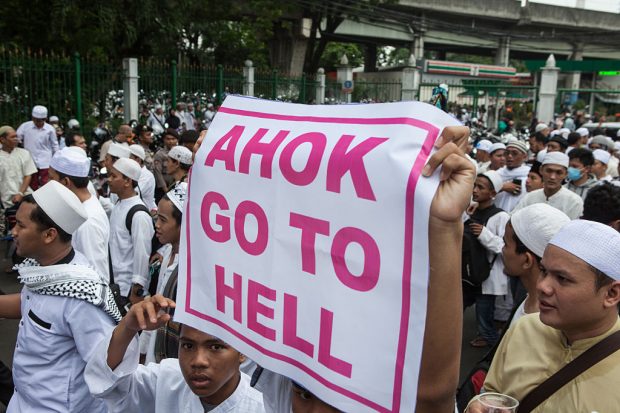 My primary school teacher used to swear by Jove to emphasise how impressed he was when one of his pupils got full marks on a spelling test. At the time, I didn’t find this odd. And at the time also I had no idea that in some countries swearing by a deity, or even talking lightly about a prophet could result in a government-imposed death sentence, or alternatively being lynched by a mob or beheaded, stabbed or shot by any random follower of a merciful deity with an unusual definition of mercy.
My primary school teacher used to swear by Jove to emphasise how impressed he was when one of his pupils got full marks on a spelling test. At the time, I didn’t find this odd. And at the time also I had no idea that in some countries swearing by a deity, or even talking lightly about a prophet could result in a government-imposed death sentence, or alternatively being lynched by a mob or beheaded, stabbed or shot by any random follower of a merciful deity with an unusual definition of mercy.
Two ‘blasphemy’ cases have been in the news recently. The first is the long-running case of Asia Bibi, or Aasiya Noreen, a Christian agricultural worker in Pakistan, who, in 2009, offended her Muslim co-workers by drinking from the same cup as they used, and, following an argument was subsequently accused by them of insulting the Prophet Mohammed. One of her accusers was involved in a property damage dispute with her family at the time.
Although Asia Bibi denied she had said anything blasphemous, she was beaten, arrested and sentenced to death by hanging. Two Pakistani politicians, Shahbaz Bhatti and Salmaan Taseer, who advocated on her behalf, and called for repeal of Pakistan’s blasphemy laws, were assassinated.
One survey reported that around 10 million Pakistanis had said that they would be willing to personally kill Asia Bibi, and, Muslim clerics in Pakistan have repeatedly called for her death.
One Muslim cleric has been reported as saying that she must be killed to discourage others. Just hoping this rationale isn’t applied to other transgressions such as parking offences or littering.
The latest appeal against her sentence has been derailed because one of the judges stepped down (the general consensus is that he was, with some reason, frightened of being killed).
There have been calls in various Western countries to stop aid to Pakistan until the appalling blasphemy laws are repealed, however the Pakistan Government is to some extent hostage to its more violent citizens, in that politicians recommending this change are likely to be killed, so they would need to have high security for quite a while.
Another tactic that has been suggested is a sporting ban, in particular, a ban on playing cricket against Pakistan would maybe help to swing public opinion against those who call for death for their fellow citizens.
(Dear Australian Cricket Board, if you can arrange to ban cricket games against Pakistan until the Pakistan Government has removed the death penalty for blasphemy, the players can spend the extra time practising batting and bowling and maybe next time do a bit better against South Africa – or alternatively they can go and promote cricket in a country where cricket’s not yet that popular, but that doesn’t kill people for blasphemy).
The second recently-publicised blasphemy case is that of Indonesian Governor Basuki Tjahaja Purnama, known as Ahok. Although only officially facing a five year jail sentence for ‘blasphemy’ he is also the subject of numerous death threats, including from the leader of the Indonesia Islamic Defenders Front, Habib Rizieq whose video inciting people to kill Ahok went viral.
What Ahok has actually been accused of saying is not clear, because anyone repeating the actual ‘blasphemy’ risks finding himself or herself a head shorter. However it appears the case against him centres on a verse from the Koran stating that Muslims should not be ruled by non- Muslims.
Ahok is reported as saying that his political opponents were using this verse to prevent people from voting for him. The blasphemy charge apparently stems from a suggestion (that Ahok denies having made) that this verse is less than perfect (and while I’m on the subject I’d like to say what a wonderful verse this is! So inclusive! So promoting of harmony! So in keeping with democracy!)
This blasphemy case, and the fact that 200,000 people marched in the street calling for imprisonment for Ahok for blasphemy was a surprise to many people outside Indonesia, as Indonesia does try to promote itself as a tolerant society — and compared to, say, Saudi Arabia, it is.
One of the scary things about blasphemy laws is that so often they are used to settle scores or persecute minority groups within a country. The laws against apostasy, which carry a death sentence in a number of Muslim majority countries, are also misused in this way, as in the case of Miriam Ibrahim sentenced to be hanged for apostasy in Sudan a while back.
The case against her was brought by family members who wanted her property, and was based on the fact that her father was a Muslim although Miriam had been brought up Christian by her mother, who separated from Miriam’s father.
Another unfortunate thing is that people who come from a country where the penalty for blasphemy or apostasy is death, export the belief that this is ok to any other country they settle in – as shown in the UK fairly recently.
Although it’s not pleasant to have your beliefs insulted, there is something incongruous about a mob baying for blood because of a perceived insult to a merciful deity whose teachings are meant to promote peace and harmony.
It is even worse when the laws of the country actually facilitate or encourage this.
Blasphemy and apostasy laws contravene the UN Charter of Human Rights, and all members of the UN, including Australian should do what they can to end these immoral ordinances with their appallingly cruel penalties.
Got something to add? Join the discussion and comment below.
Get 10 issues for just $10
Subscribe to The Spectator Australia today for the next 10 magazine issues, plus full online access, for just $10.

























Comments
Don't miss out
Join the conversation with other Spectator Australia readers. Subscribe to leave a comment.
SUBSCRIBEAlready a subscriber? Log in